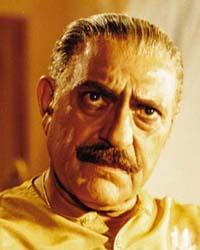 “Baat Itni Si Hai Ki Vibhajit Hokar Main Kissi Na Kissi Ansh Mein Aap Mein Se Har Ek Vyakti Hoon,” (It is just this-even after being divided or split, in some part or another, I am everyman among you). I remembered these words from Amrish Puri’s autobiography, The Act Of Life while watching a favourite performance that I can revisit again and again with renewed emotion.
“Baat Itni Si Hai Ki Vibhajit Hokar Main Kissi Na Kissi Ansh Mein Aap Mein Se Har Ek Vyakti Hoon,” (It is just this-even after being divided or split, in some part or another, I am everyman among you). I remembered these words from Amrish Puri’s autobiography, The Act Of Life while watching a favourite performance that I can revisit again and again with renewed emotion.
His role of a seething,bitter, autocratic patriarch in Sawan Ko Aane Do. The film has this amazing moment when things come full circle and he has been forced by life to confront the futility of his ego. He sits alone somewhere near the climax in a dilapidated home, a shadow of his former arrogance and has to face the man he had humiliated for daring to fall in love with his daughter and wanting to wed her. That village simpleton is back after becoming a huge success (Arun Govil) and Puri says something to this effect, “Tumne poocha tha ki mujhe tumhari shaadi se koi aitraaz toh nahin. Tumhare sawal ka jawaab mujh par udhar hai Birju..mujhe koi aitraaz nahin“(You had asked me once if I had any objections to your marriage. My answer to you is a debt I must pay. I have no objections).
Everytime I see Puri in this scene, I can think of just one word, ‘Gravitas.’ He was every man truly. Vulnerable and strong. Ordinary and kind. Towering and fearful. In an era, where actors are extinct and performers rule, he straddled natural emoting and exaggerated mannerisms effortlessly.
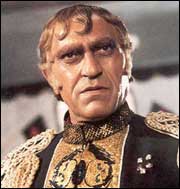 His name brings back to memory, a gaunt, unforgettable face, a rock solid screen presence that could never be ignored and images of varied tonal intensities. The toss of a well-oiled hairlock in Damini when his corrupt Chaddha confronts a rival in the court-room and outside it. His gold-booted stride and cartoonish joy in Mr India when he gloats and says, “Mogambo Khush Hua!’’
His name brings back to memory, a gaunt, unforgettable face, a rock solid screen presence that could never be ignored and images of varied tonal intensities. The toss of a well-oiled hairlock in Damini when his corrupt Chaddha confronts a rival in the court-room and outside it. His gold-booted stride and cartoonish joy in Mr India when he gloats and says, “Mogambo Khush Hua!’’
The gentle giant of Muskurahat. The tortured idealist of Gardish. The cancer-stricken patriarch of Ghatak. The unbending village bully of Nishant. The murderer in Shakti, dodging Amitabh Bachchan memorably in a crowded Airport till his dilated eyes see death in the bathroom mirror. The village chieftain of Virasat. The hospitable army man with a younger wife in Mujhse Shaadi Karogi. The principled gangster aching for his son in Phool Aur Kaante. The straight-backed Sikh of Tamas. The lustful Zamjndar of Chann Pardesi.
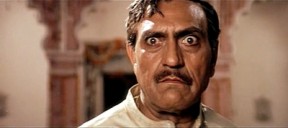 The stalwart air-force officer of Vijeta. The Oye Oye warbling bad man in Tridev. The indulgent dada egging his shy grandson towards the girl he loves in Mujhe Kucch Kehna Hai. The unforgiving father of Zubeida. The unyielding Pakistani of Gadar-Ek Prem Katha. The nostalgic NRI of Pardes and the stiff-necked Baujee of DDLJ. The blood-curdling urban villain of Ghayal and Samundar. Dilip Kumar’s foe in Vidhaata and Mashaal. Subhash Ghai’s mainstay in Ram Lakhan, Saudagar and many more films and India’s first major break-through export to the West where he played the villain in Steven Spielberg’s Indiana Jones and the Temple of Doom.
The stalwart air-force officer of Vijeta. The Oye Oye warbling bad man in Tridev. The indulgent dada egging his shy grandson towards the girl he loves in Mujhe Kucch Kehna Hai. The unforgiving father of Zubeida. The unyielding Pakistani of Gadar-Ek Prem Katha. The nostalgic NRI of Pardes and the stiff-necked Baujee of DDLJ. The blood-curdling urban villain of Ghayal and Samundar. Dilip Kumar’s foe in Vidhaata and Mashaal. Subhash Ghai’s mainstay in Ram Lakhan, Saudagar and many more films and India’s first major break-through export to the West where he played the villain in Steven Spielberg’s Indiana Jones and the Temple of Doom.
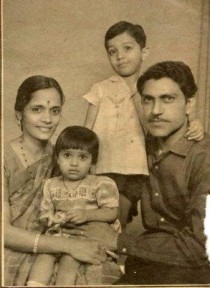 His intuitiveness and method melded to create unforgettable screen characters and yet little is known about the man who brought respectability, credibility and star appeal to a villain’s slot.
His intuitiveness and method melded to create unforgettable screen characters and yet little is known about the man who brought respectability, credibility and star appeal to a villain’s slot.
I read The Act Of Life, his collaborative autobiography with Jyoti Sabharwal (published by Stellar) in 2007 and learnt a little about this principled, hardworking, disciplined, God loving, humble and simple man who gave up a regular job at the age of 40 and remained a professional actor till almost the very end. A star who did his own packing before every outdoor shoot and even stitched buttons on his shirts and polished his own shoes and remained a student of acting till he died (January 12, 2005).
He remained an inspired actor till the end, gleaning much from the method acting of Olivier, the dedication of Dilip Kumar, the natural genius of Moti Lal, the power of Anthony Quinn and the physical bravado of Burt Lancaster among others.
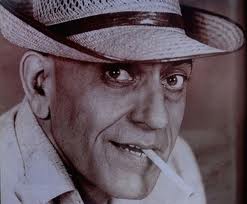 The book talks about the commitment which kept him afloat through good films and bad. He wrote with straight-faced humour about his experiences with overconfident fight masters, two generations of actors, stingy producers, awards he did not get, late coming co-stars, IT raids, underworld threats, regional cinema, parallel cinema, the callous actors of today, vertigo induced amnesia and dangerous climax sequences that he managed with a swagger in his 70s! This is a sweeping story of one of the last genuine actors who gave more to the industry than they got from it.
The book talks about the commitment which kept him afloat through good films and bad. He wrote with straight-faced humour about his experiences with overconfident fight masters, two generations of actors, stingy producers, awards he did not get, late coming co-stars, IT raids, underworld threats, regional cinema, parallel cinema, the callous actors of today, vertigo induced amnesia and dangerous climax sequences that he managed with a swagger in his 70s! This is a sweeping story of one of the last genuine actors who gave more to the industry than they got from it.
Nothing sums up his life better than these words, “I have never rejected the actor in me, never offended or humiliated him because I know I can be alive only if the actor in me is alive.’’ June 22 is his birthday and Amrish Puri lives on.
Reema Moudgil is the author of Perfect Eight (http://www.flipkart.com/b/books/perfect-eight-reema-moudgil-book-9380032870?affid=unboxedwri )





